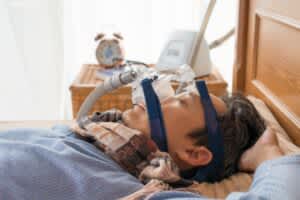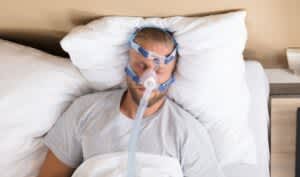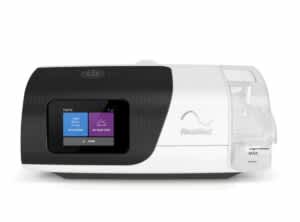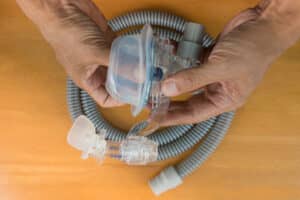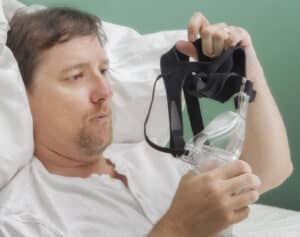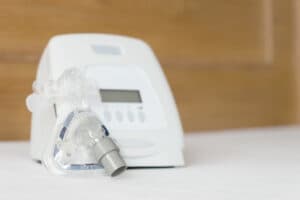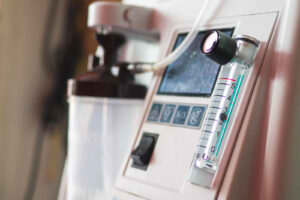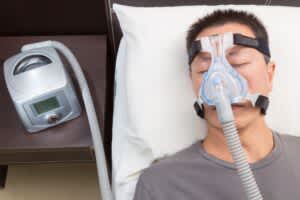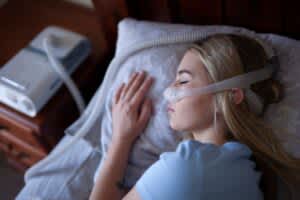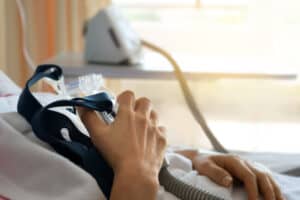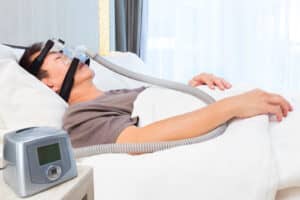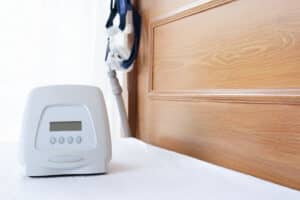For people with obstructive sleep apnea (OSA), the difference before and after continuous positive airway pressure (CPAP) therapy can be significant. When used consistently, a CPAP machine can offer benefits like better sleep, enhanced productivity, and reduced long-term health risks.
CPAP therapy is one of the most effective treatments for OSA, which involves repeated breathing interruptions during sleep. By delivering air through a mask and into the airway, a CPAP device can stabilize breathing and improve overall health.
Impacts of Sleep Apnea Before Treatment
Before treatment, OSA can impact sleep and everyday health. OSA involves recurring pauses in breathing that trigger short awakenings throughout the night. When left untreated, disrupted breathing and fragmented sleep can cause numerous short-term symptoms, including:
- Loud snoring
- Gasping or choking during sleep
- Excessive daytime sleepiness and a tendency to doze off at inappropriate times
- Impaired focus, memory, and other elements of thinking
- Morning headaches
- Frequent urination at night
- Elevated risk of accidents, including when driving or working
Long-Term Risks of Sleep Apnea
In addition to its immediate effects, untreated OSA heightens the risk of a number of serious medical conditions and overall mortality.
By interfering with normal processes of sleep and lowering oxygen levels in the body, sleep apnea can lead to cardiovascular problems. For example, untreated OSA is linked with a greater risk of high blood pressure, stroke, heart attack, and heart disease.
OSA can negatively affect how the body manages blood sugar, making it more likely for people with untreated OSA to develop type 2 diabetes. OSA increases the risk of liver disease and has been associated with acid reflux, asthma and lung problems, and kidney disease.
Other Potential Effects After Using CPAP
CPAP therapy can reduce the symptoms of OSA, improve quality of life, and decrease the chances of long-term health complications. With consistent use, a CPAP can have many potential positive effects.
Sounder Sleep
A CPAP keeps breathing steady during sleep, which minimizes interruptions and makes it easier to wake up well-rested. For most people, sleep improves almost immediately after starting CPAP therapy, and healthier sleep patterns develop within the first week.
Reduced Snoring
Very loud and frequent snoring is common in people with OSA, and CPAP therapy is calibrated to resolve this bothersome symptom.
Greater Daytime Energy and Focus
By reducing sleep fragmentation, CPAP therapy can boost daytime alertness. Using a CPAP supports better concentration, clearer thinking, and improved productivity.
Lower Risk of Accidents
People with untreated OSA are at least twice as likely to have a car crash related to drowsy driving. After CPAP treatment, alertness improves, and the risk of accidents decreases.
Improved Sleep For a Bed Partner
Nightly use of a CPAP can improve the sleep of a bed partner since they can avoid disruptions from a person who OSA snoring or tossing and turning in bed.
Enhanced Mental Health
People with OSA who use a CPAP report having a better mood and fewer symptoms of depression. Using a CPAP enables better sleep, which has a close connection with mental health.
Better Cardiovascular Health
By treating OSA, CPAP machines can promote cardiovascular health, including better control of blood pressure. While the exact impact of CPAP therapy on the likelihood of heart attack and stroke is not clear, growing evidence points to a reduced risk when a CPAP is used consistently.
Better Metabolic Health
OSA makes it harder for the body to regulate blood sugar levels, and CPAP therapy can help address this problem and support metabolic health.
Reduced Risk of Other Health Problems
Studies have found that regular use of a CPAP for OSA can potentially deliver other benefits, including:
- Lower risk of erectile dysfunction
- Decreased acid reflux
- Reduced symptoms of asthma
Ready to Treat Sleep Apnea? Start With a Home Sleep Test

Save 54% on your Sleep Test Today
Simple and convenient
- Equipment delivered to your doorstep
- One overnight test in the comfort of your own bed
Uncover sleep apnea
- Quietly collects data while you sleep
- 98% effective in detecting sleep apnea
Affordable & ships fast
- In-lab sleep tests cost ~$3,000+ (this one’s $189), HSA/FSA eligible
- Arrives in 2-4 business days
Getting Started With CPAP Treatment
Your doctor or a sleep specialist will help you get started with CPAP therapy. They will provide a CPAP device and accessories, including a CPAP mask. The CPAP comes with settings that are designed to prevent breathing interruptions at night.
It is normal to encounter challenges in adjusting to using a CPAP when you first get started. Certain tips may help you stick with CPAP therapy:
- Acclimate faster by by using the device as much as possible
- Focus on the positives of treatment, including better sleep
- Practice using the CPAP while you’re awake and doing other activities, like watching TV
When To Talk To Your Doctor About Side Effects
To make it easier to get the most from CPAP therapy, talk with your doctor if you have any side effects that impact your ability to continue using your CPAP. Being proactive enables earlier troubleshooting, which may involve your doctor making simple adjustments to your mask or pressure settings that can dramatically improve the comfort and success of CPAP therapy.
References
Ask the Sleep Doctor
Have questions about sleep? Submit them here! We use your questions to help us decide topics for articles, videos, and newsletters. We try to answer as many questions as possible. You can also send us an email. Please note, we cannot provide specific medical advice, and always recommend you contact your doctor for any medical matters.





























